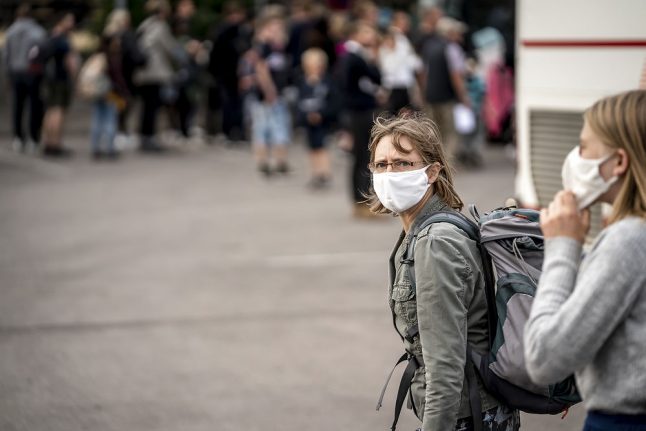In a statement released on Friday, the authority said it was “extending its recommendations for the use of face masks in certain situations”.
“It is advantageous to use a face mask when using public transport at times when it is difficult to keep a distance from other passengers,” the health agency wrote on its website.
Vi har udvidet vores anbefalinger om brug af mundbind i særlige situationer – og anbefaler nu også mundbind, hvis man bevæger sig ud i den kollektive trafik på tidspunkter, hvor det er svært at holde afstand til andre passagerer https://t.co/KNfEiDTagU #coronavirus #covid19dk pic.twitter.com/H3tuM2AxFz
— Sundhedsstyrelsen (@SSTSundhed) July 31, 2020
Coronavirus infection rates remain at a low level in Denmark at the current time, despite a relative uptick since the beginning of July.
91 new cases of coronavirus were registered by national infectious disease institute SSI on Thursday, the highest daily infections figure in the country since May 18th. But Friday’s figure was down on that number, with 64 new infections registered.
57 new cases were registered on Wednesday and 30 on Tuesday.
Average daily new Covid-19 infections in Denmark have crept up throughout the last month. The week commencing July 5th saw an average of 18 new cases per day. That had increased to 41 by last week.
In its announcement expanding face mask recommendations, the national health authority noted that “there are no clear signs of specific geographical areas with many cases of infection over a longer period.”
“But more smaller outbreaks may occur in the near future, and we will perhaps see a rapid increase,” the statement continues.
People returning from holiday and the re-opening of workplaces and return to schools are all possible factors in this, DHA said.
“If we are to keep the epidemic under control, good distance and clean hands are still important,” director of the Danish Health Authority Søren Brostrøm said.
“In the time to come, we will move more closely together as we return to work and school and as colder weather approaches. That can make it harder to keep your distance in many situations, even if you want to,” Brostrøm continued.
“This is relevant on public transport during rush hour or on tightly packed buses, trains and ferries. That is why we are now recommending that you bring a face mask with you in your bag in those situations, and put it on if it is difficult to keep your distance,” he said.
Brostrøm said the primary purpose of wearing a face mask is to prevent the wearer from spreading the virus if that person is infected but symptom-free. It can also provide extra protection for people in risk groups who may have difficulty keeping a distance of two metres.
Danish health authorities will also monitor infection data with a view to extending face mask recommendations to more situations, such as at shopping malls and other gathering places, according to the DHA statement.
After not advocating their general use at the beginning of the coronavirus epidemic, Danish health officials began cautiously recommending using masks in early July, advising them in certain circumstances, including when travelling home from areas considered high-risk or on the way to being tested for coronavirus.
Earlier this week, Brostrøm said that current infection levels in Denmark did not indicate the use of face masks, but that their use “could make sense in the longer term”.
In June, The World Health Organisation updated its recommendations over face masks, recommending governments ask health members of the public wear non-medical face masks in areas where the virus is being transmitted to the community, if it is difficult to keep social distance, or in crowded areas such as on public transport.
READ ALSO: Denmark opens to travel from all of Sweden



 Please whitelist us to continue reading.
Please whitelist us to continue reading.
Member comments